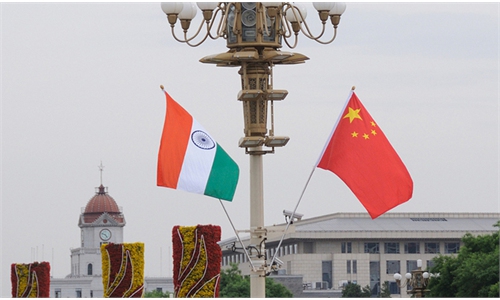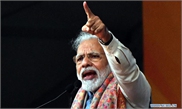COMMENTS / EXPERT ASSESSMENT
Confrontation with China 'suicide' for Indian economy

Illustration: Tang Tengfei/GT
India has recently intensified tensions with China following a fatal border clash. There is a campaign to boycott Chinese products and Indian authorities are reportedly mulling higher trade barriers. These are undoubtedly suicide paths for India's economic development.India seeking confrontation with China was largely due to political reasons. The Indian government has chosen to continue easing lockdown restrictions despite the country's surging numbers of confirmed COVID-19 cases - over 410,000 by Monday - showing its economy cannot afford further lockdown. While stirring up confrontation with neighboring countries may relieve some pressure from virus prevention efforts, it is also a result of internal political disputes between different parties seeking political interests by instigating nationalism. However, intensifying confrontation with China is a self-destructive choice for the nation's economy.
In terms of global value chains, India won't have many choices left if it wants to boycott Chinese products, and would only bring higher costs for its firms and customers. Additionally, some Indian industrial sectors rely heavily on supplies from China and are unable to operate without cooperation with China.
After months of lockdown, India has already seen serious economic fallout. Imports in April slumped 48.3 percent year-on-year and exports dropped 33.7 percent year-on-year, according to official Indian data. Foreign direct investment in April also reported a deep slide, down to $1.37 billion, falling 52.5 percent from the previous month, per data from global economic data provider Trading Economics.
Under such circumstances, it is irrational for India to heat tensions or reduce economic ties with China as the two countries are not in the same heavyweight class. China has been a top trading partner of India for years, while China's exports to India have accounted for about 2 percent of its total exports. Restricting imports or investment from China under globalized value chains is not simple for India as East Asian countries have developed highly integrated industrial chains. The restrictions will inevitably hinder its cooperation with other countries and worsen India's business environment in the long run. And India will not develop a sound industrial system by restricting China, the most important link in global industrial chains.
It would be a rational choice for India to further involve itself in the cooperated development of Asian regional economies. For instance, India and China maintain high cooperation potential in the infrastructure sector, as China can offer ideal plans at the most reasonable prices to the world.
By contrast, the economic synergy between India and developed Western countries is now much weaker as major industrial relocations from developed countries have been completed and India has not developed sufficient capacity to replace China or other Southeast Asian countries due to its insufficient infrastructure, less competitive labor force and fatal flaws in its system reforms.
The US, under the Trump administration, has been luring India to join its anti-China clique by inviting the country to attend this year's G7 summit, forming a "G11," or by enhancing the Indo-Pacific strategy. Regardless of whether or not these strategies could even be effective, they are actually political or strategic moves to further the US' attempts to suppress China's development, and would hardly bring realistic benefits to India.
Though pursuing tighter cooperation with China and other Asian countries could benefit India, economic cooperation must be built on the foundation of a benign relationship, which has been sabotaged by India. The country needs to devise rational economic strategies based on the comprehensive assessment of its own capacity to avoid following a self-destructive path.
The author is a senior research fellow of the Academy of Regional and Global Governance, Beijing Foreign Studies University and president of the Chengdu Institute of World Affairs. bizopinion@globaltimes.com.cn


